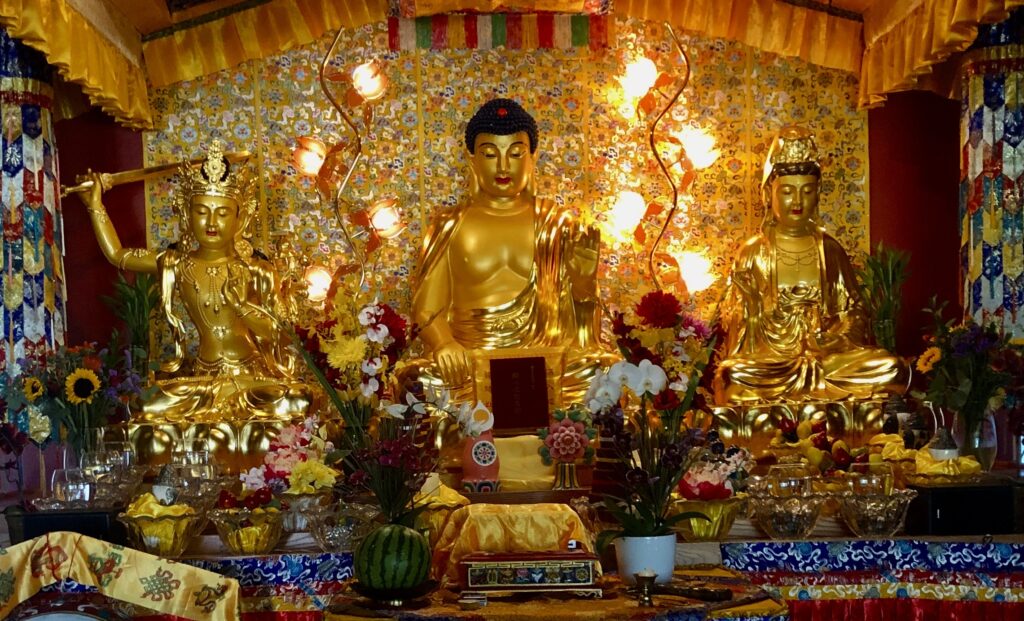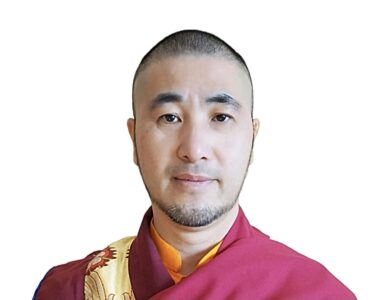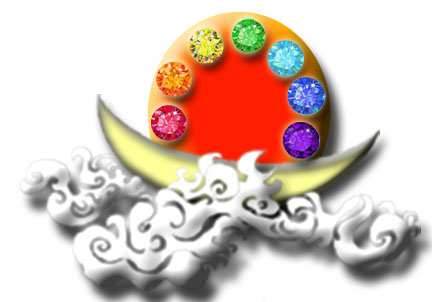
Having received requests for this article with the chants we chant during the 6:00 am temple zoom boadcast, I am reposting FYI. Please note that some chants that we use have been added as they are now available in other forms.
I want to again give a shout out to Reba Jinbo Rinpoche, Hua De (Derby Woo), Hua Qing (Don Asper), Amita (Rebecca Hunt), Anjurshri (Armine Alioto), and all those who join the 6:00 am chanting every morning at the temple via ZOOM for bringing us these chants, Dharma reflections, meditation, and sutra readings. If you are not able to join them, you can use these chants to follow on your own or with your sangha. I believe they include the essence of what our Buddha Master transmitted to us plus the classics that millions of Buddhists have recited daily over the centuries. Click the gold framed titles of the chants below for links to articles on the chant that explain why they are included. The article on the Great Compassion (Maha Karuna) Dharani is posted again with an English translation of the Sanskrit, as requested. And CLICK for the links to join us via ZOOM whenever you can. It is a great day to start your day or whenever it may happen in your time zone.
The following chants are an abbreviated version of The Holy Vajrasana Temple and Retreat Center Chant Book that we also use for on-line classes. We will not always use all of these, but select chants that are appropriate to the particular class. We also do not chant every one of the “Learning from Buddha” mantras every day, but we do try and reflect on them as often as possible. The Buddha Master told us in Learning from Buddha that we should do so three times every day–when we get up, mid-day and before we retire at night. I know that not all of you can join us for a 6:00 am Pacific joint chant, but I urge you to use these chants in your daily reflection as per the Buddha’s instruction. It is powerful to do the chanting as a group and you may want to start your own group within your immediate sangha.
The Buddha Master told us we should understand the meaning of what we are chanting–maybe not the actual words as some are transliteration of holy Sanskrit or Tibetan sounds that cannot be translated, but we should know what they do and why we chant them. I have included the most important dharmas that we reflect on as part of our daily examination of ourselves and how well we have put into practice what we have learned from the Buddha. We also chant certain dharmas at the temple that are not listed below like the Tashi Tsigpa in English, Tibetan, and sometimes Spanish; Vajrasattva’s One-Hundred-Character Bright Mantra from the Supreme and Unsurpassable Mahamudra of Liberation; and others.
Additional chants will be added as they become available. We now include both of the Most Excellent Oceanic Mind-Essences available from the Supreme and Unsurpassable Mahamudra of Liberation as part of our Sunday morning service, but we cannot print them yet for you.
Incense Offering
Incense Burning,
All space is filled with the fragrance.
All Buddhas smell it from afar. Auspicious clouds gather everywhere.
With utmost sincerity, All Buddhas appear.
We pay homage and offer clouds of incense to the Bodhisattvas and the Mahasattvas! [Repeat this line three times.]
Praise to the Buddhas
[Nan Mo] Zhu Shi Fo Tuo Di San Shi Duo Jie Qiang Fo (3X)
[Namo H.H. Dorje Chang Buddha III, the Buddha presently living in the world.]
Nan Mo Suo Po Shi Jie Fo Jiao Jiao Zhu Shi Jia Mou Ni Fo (3X)
[Namo Shakyamuni Buddha, the supreme leader of Buddhism in the saha world.
The Four Buddhist Vows (Preliminary Practices)
Defilements are countless; I vow to put an end to them.
Dharma methods are limitless; I vow to learn them.
Living beings are innumerable; I vow to save them.
Buddhahood is unsurpassable; I vow to realize it.
Great Compassion Mantra (Mahakaruna Dharani)
[Nā mo] hē là dá nà duō là yè yé。
Nā mo a lī yé pó lú jié dì shuò bō là yé。
Pú tí sà duǒ pó yé。
Mó hā sà duǒ pó yé 。
Mó hā jiā lú ní jiā yé。
OM。 Sà pan là fá yì。
Shù da nă dá xiĕ。
Nā mo xī jí lí duǒ yī mēng a lī yé。
Pó lú jié dì shì fó là léng tuó pó。
Nāmo nă là jĭn chí 。
Xī lī mó hā bó duō shā miē。 Sà pó a tā dòu shū péng a shì yùn。 Sà pó sà duō nă mó pó sà duō
Nă mó pó qie mó fá tè dòu。
Dá zhí tuo 。OM a pó lú xī。Lú jiā dì 。Jiā luó dì 。Yí xī lī 。Mó hā pú tí sà duǒ。
Sà pó sà pó。 Mó là mó là。
Mó xī mó xī lī tuó yùn。
Jù lú jù lú jié méng。
Dù lú dù lú fá shé yé dì 。
Mó he fá shé yé dì。
Tuó là tuó là dì lī ní shì fó là yē。
Zhē là zhē là。Mó mó fá mó là。
Mù dì lì。Yī xī yī xī。 Shì nă shì nă。A là shēn fó là shě lì。
Fá shā fá shēn fó là shě yé。
Hū lú hū lú mó là。 Hū lú hū lú xī lī 。
Suō là suō là。 Xī lī xī lī 。Sū lú sū lú。 Pú tí yè pú tí yè。
Pú tuó yè pú tuó yè。
Mí dì lī yè nă là jĭn chí。
Dì lī sè ní nà。
Bō yè mó nà suō pó he。
Xī tuó yè suō pó he。
Mó hā xī tuó yè suō pó he。
Xī tuó yù yi shì pan là yè suō pó he。
Nă là jĭn chí suō pó he。
Mó là nă là suō pó he。
Xī là sēng a mù qū yé suō pó he。
Suō pó mó hā a xī tuó yé suō pó he。
Zhě jí là a xī tuó yè suō pó he。
Bō tuó mó jié xī tuó yè suō pó he。
Nă là jĭn chí pan qié là yé suō pó he。
Mó pó lì shèng jié là yè suō pó he。
Nā mo hē là dá nà duō là yè yé。
Nā mo ě lì yé
Pó lú jí dì shuō pan là yè suō pó he。
An xī diàn dū màn duō là。 Bá tuó yé suō pó he。
Jīn gang shèng zhuāng yán suō pó hē
Mó jié shèng zhuāng yán suō pó hē
Shēng wén shèng zhuāng yán suō pó hē Ong, Bá shě là shì lì ye suō pó hē
Contemplation of Impermanence (Vajra Yoga Perfection Dharma)
All conditional phenomena are like a dream, an illusion, a bubble, a shadow, morning dew, or a flash of lightening.
All sentient beings will definitely die.
All inanimate things will definitely perish.
This principle also applies to my body, which is composed of the four great elements.
I will be separated from my family and friends one day.
Time is pushing my age forward, early youth is followed by the robust years of life, which is followed by old age, which is followed by death.
Sounds or flowing water never return after they are gone.
The thoughts and words of this very moment have already become impermanent.
I will come closer and closer to death.
Death has no set time to it.
I could go to the next world at any moment simply because my breathing stops.
I can take no worldly possessions whatsoever with me to the next world.
These principles apply to my very own body.
I am intent upon leaving the cycle of reincarnation.
The Three Groups of Purifying Precepts (Preliminary Practices)
I vow to cut off all evil within me. There will be no evil that I will not cut off.
I vow to practice all types of goodness. There’ll be no type of goodness I will not practice.
I vow to save all living beings. There’ll be no living being that I will not save.
Ten Good Characteristics (Preliminary Practices)
I will observe the following:
No killing; free captive living beings.
No stealing; perform charity.
No sexual misconduct; practice chastity.
No speaking falsely; speak truth.
No trivial chit-chat or ornate, lewd, or inappropriate speech; do straight talk.
No speaking divisively; bring about peace & accord.
No speaking harshly; use gentle words.
No lust or greed; hold correct view.
No anger; have benevolence and compassion.
No ignorance; rather know everything is a matter of causes & conditions.
The Four Limitless States of Mind (Preliminary Practices)
- May all living beings always be peaceful and happy and maintain the causes of peace and happiness: loving kindness.
- May all living beings always be free from suffering and the causes of suffering: compassion.
- May all living beings always be free from suffering and my own heart be delighted about this: sympathetic joy.
- May all living beings stay far away from greed and anger and abide in non-differentiating generosity.
The Six Paramitas (Preliminary Practices)
I must:
- Be generous, overcome greed,
- Keep precepts, overcome violations,
- Endure insults, overcome hate and anger,
- Be energetic, overcome laziness,
- Be concentrated, overcome disorder,
- Develop prajna, overcome ignorance.
The Dharma of Cultivation
I will always hold the eight fundamental right views as the foundation for my cultivation, liberation, and accomplishment in the dharma:
Impermanence
Firm belief
Renunciation
True vows
Diligence
Precepts
Dhyana and samadhi
Bodhicitta
I will follow the Dharma of Great Compassion for All Living Beings as my Mother Bodhicitta by:
Understanding who my mother is,
Bearing in mind kindness,
Repaying kindness,
Practicing loving-kindness,
Demonstrating compassion, Renouncing greed, and
Eliminating attachment.
I will observe the Dharma of Bodhisattva Correspondence Bodhicitta by practicing:
Self and others are equal bodhicitta.
Exchange between self and others bodhicitta.
Benefit others before self bodhicitta.
Dedicating merit bodhicitta.
Fearlessly protecting the dharma bodhicitta.
Effectively leading others to correct practice bodhicitta.
Renouncing myself to help others build good karma bodhicitta
Seven Joint Preliminary Practices (Supreme and Unsurpassable Mahamudra of Liberation)
Obtaining a human body is difficult,
Death and impermanence are imminent,
Samsara is suffering,
Karmic retribution is inevitabile,
The true dharma is now available,
My attachment to self must be cut off,
I must save myself and then save others.
The Wrongs of Others Are My Wrongs (Dharma Discourse, “Determining Who Is a True Vajra Master”)
The wrongs of others are my wrongs.
To regard others and yourself as one is great compassion.
A true cultivator regards the mistakes of others as his own mistakes.
Do not talk about the wrongs of others.
Do not make known your meritorious deeds.
Speaking of your meritorious deeds shows your dark karma.
Cutting off the Twenty Dharmas Relating to Ordinary Feelings (Dharma Discourse: “Twenty Dharmas of Ordinary Feelings”)
I will cut off ordinariness and enter holiness.
I will discard and not be attached to any of the twenty dharmas of ordinary feelings including: Fame, Gain, Prosperity, Decline, Good fortune, Gladness, Increase, Decrease, Antipathy, Resentment, Anger, Hatred, Scheming, Defamation, Seizing, Harming, Illness, Suffering, Parting, and Death.
Learning From Buddha
[Let us take a few moments to examine ourselves and how well we have put into practice what we have learned from the Buddha considering the dharmas we just chanted and others. We also include one of the following quotes with these instructions:]
‘In the morning, introspect about how during the day you should act to become a purely good and compassionate person, a person who benefits the public. At midday, think back: “From morning until midday, did I have that kind of mindset and conduct?” At night, again think back: “From midday until night, did I have that kind of mindset and conduct? Are the things I did today truly reflective of the conduct, speech, and mindset of a Bodhisattva at the causal stage?” (Learning from Buddha, p. 6)
-OR-
“Cultivation should stem from the bottom of your heart, from your bodhicitta. Be truly friendly and loving to one another and to your spouse. Be amicable to your fellow brothers and sisters. Care about and act cooperatively with friends and other people. Help and care about living beings. Apply the true Four Limitless States of Mind and bodhicitta. Examine yourself at all times and on all occasions. At all times, reflect upon yourself.” (Learning from Buddha, p. 33)
Gatha on Opening the Sutra
An unsurpassed, penetrating, and perfect Dharma
Is rarely met with even in a hundred thousand million kalpas.
Having it to see, listen to, to remember, and accept,
I vow to taste the truth of the Tathagata’s words.
Prajna-Paramita Heart Sutra. (Expounding the Absolute Truth through the Heart Sutra)
(Please note that we have not revised the translation that we have used for years. You will find a few changes in the translation in the translation used in ETATTTHS. We will update this in our chant book when the English translation of ETATTHS is released.)
Avalokitesvara Bodhisattva, when practicing deeply the prajna-paramita, illuminated the five aggregates, saw that they are all empty, and crossed beyond all suffering and adversity.
Sariputra, form does not differ from emptiness; emptiness does not differ from form.
Form is emptiness; emptiness is form.
The same is true of feeling, conceptualization, volition, and consciousness.
Sariputra, emptiness is the characteristic of all dharmas.
They do not arise or perish, are not defiled or pure, do not increase or decrease.
Therefore, in emptiness there is no form, no feeling, conceptualization, volition, or consciousness;
no eyes, ears, nose, tongue, body, or mind;
no forms, sounds, smells, tastes, touches, or mental phenomena;
no realm of eyes, up to and including no realm of mind consciousness;
no ignorance and also no ending of ignorance, up to and including no aging and death and also no ending of aging and death;
no suffering, no accumulation, no cessation, and no path;
no wisdom, also no attainment.
With nothing to be attained, therefore, the Bodhisattvas rely on prajna-paramita, and thus their minds have no hindrance.
Because there is no hindrance, they have no fear.
Having forever left inverted dream-thinking, they dwell in ultimate nirvana.
All Buddhas of the three times rely on prajna-paramita and thereby attain anuttara-samyak-sambhodi.
Therefore, know that prajna-paramita is the great supernormal mantra,
the great bright mantra,
the supreme mantra,
the unequaled mantra,
which can remove all suffering and is true, not false.
So recite the prajna-paramita mantra,
recite the mantra that says:
gate gate paragate parasamgate bodhi svaha.
Heart Mantra of Kuan Yin Bodhisattva (Vajra Yoga Perfection Dharma)
[Repeat 21 or 108 times or chant for ten minutes]
ONG MA NI BA MI HONG (Chinese)
Or
Om Ma ni Pe me Hung (Tibetan)
Or
Om Ma Ni Pad Me Hum (Sanskrit) (Ohm ) (mah) (nee) (pahd) (may) (hum)

Praise to the Bodhisattvas
[Namo] Guanshiyin Pusa (Kuan Shi Yin Bodhisattva)Namo Da Shi Zhi Pusa (Mahasthamaprapta Bodhisattva)
Namo qingjing da hai zhong Pusa (Great Pure Sea of Bodhisattvas)
Refuge Vows. (Preliminary Practices)
To the Buddha I return and rely, vowing that all living beings profoundly understand the great way and bring forth the Bodhi Mind.
To the Dharma I return and rely, vowing that all living beings deeply enter the sutra and have wisdom like the sea.
To the Sangha I return and rely, vowing that all living beings apply love and compassion to all.
Skanda Bodhisattva
[Namo] Hufa Weituo Zun Sheng Da Pusa
[Repeat 3 times]
Vajrasattva’s One-Hundred-Character Bright Mantra. (Supreme and Unsurpassable Mahamudra of Liberation)
zOng, Ban Zaer Sa Duo Sa Ma Ya
Ma Nu Ba La Ya,
Ban Zaer Sa Duo De Luo Ba Di Cha,
Zhi Zhuo Mai Ba Wa,
Su Duo Ka Yue Mai Ba Wa,
Su Bo Ka Yue Mai Ba Wa,
A Nu Re Duo Mai Ba Wa,
Sa Wa Si Di Mai Zha Ya Cha,
Sa Wa Ga Ma Su Za Mai,
Zi Dang Xier Yang Gu Ru Hong,
Ha Ha Ha Ha, Huo,
Ba Ga Wa Na,
Sa Wa Da Ta Ga Da,
Ban Zaer Ma Mai Mu Za,
Ban Za Ba Wa,
Ma Ha Sa Ma Ya,
Sa Duo A, Hong Pei, Duo Jie Sheng Ba La Qia Che.
Samantabhadra Bodhisattva’s Verse of Exhortation (only evenings)
This day is already done. Now our lives are that much less.
We’re like fish in a shrinking pond. What joy is there in this?
We should be diligent and vig-or-ous,
as if our own heads were at stake.
So don’t be lax; stay mindful of im-perm-an-ence.
Homage to H.H. Dorje Chang Buddha III 21X
[NAMO] DI SAN SHI DUO JIE QIANG FO
Dedication of Merit
[Let us dedicate the merit of our chanting and praises to living beings everywhere in the six realms of existence and silently to whomever we want to receive special merit.]
May the merit accumulated from this practice,
Benefit all beings equally.
May all beings Increase their fortune and wisdom,
And may they always have peace and auspiciousness.
Wish-Fulfilling Mantra (Vajra Yoga Perfection Dharma) 7X
DA YA TA ONG BANZARer YU YI YA A WA BU DA LA SUO HE
This article was originally posted February 21, 2023. Certain mantras have been added as they have become available in printed form and on the internet. The only thing that is missing is the “Tashi Tsigpa (The Verses of the Eight Auspicious Ones),” which we chant at the beginning after “The Four Buddhist Vows”. It still does require transmission in some places.





Thank You most auspicious master